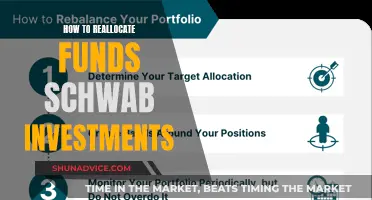
Home equity investment (HEI) is a financial strategy that allows homeowners to turn their home equity into cash. Homeowners can sell a portion of their home's future value in exchange for a lump-sum payment. This type of investment is also known as a home equity sharing agreement, and it is different from a traditional loan or line of credit because it does not require monthly payments or interest charges. Instead, the investor will claim a percentage of the home's appreciation in value at the end of the term or when the property is sold. HEIs are a good option for those who need cash but cannot take on additional debt or qualify for traditional loans due to low credit scores or inconsistent income. However, it's important to consider the risks, such as the possibility of losing out on significant wealth if the home's value increases substantially.
| Characteristics | Values |
|---|---|
| Definition | A financial agreement that allows homeowners to turn their home equity into cash |
| Type | Investment, not a loan or debt |
| Monthly payments | No |
| Interest charges | No |
| Credit score requirements | More lenient than for other equity products |
| Income requirements | No minimum income requirements |
| Use of funds | No restrictions |
| Repayment | One balloon payment when the homeowner sells the home, refinances, or via another source of funds |
| Investor's stake | The investor won't hold any ownership stake or be added to the home's title |
| Investor's share | The investor will receive a percentage of the home's equity in the future |
| Investor's claim | The investor will claim a portion of the proceeds when the homeowner sells the home or takes out a cash-out refinance |
| Investor's role | The investor is a partner in the home's change in value |
| Agreement duration | 10 to 30 years |
| Fees | Origination or investment fees, appraisal fees, closing costs, title charges, filing fees, government recording fees |
What You'll Learn

Home Equity Investment (HEI) vs. home equity loan
Home equity investment (HEI) is a strategy for turning your home equity into cash. It is also referred to as a home equity sharing agreement (HESA) or a home equity agreement (HEA). With HEI, you receive a lump-sum payment from an investment company in exchange for a share of your home's future value. There are no monthly payments or interest charges; instead, you buy out the investor's equity share before the end of the term, which can be up to 30 years.
On the other hand, a home equity loan is a lump-sum payment borrowed against your home equity, which you repay over a fixed term with interest. Home equity loans typically have stricter credit score and income requirements than HEI. Additionally, home equity loans require monthly payments, while HEI does not.
- HEI is not a loan, while a home equity loan is a form of debt.
- HEI does not require monthly payments or interest charges, whereas home equity loans require regular payments and incur interest.
- HEI may be a better option for those with poor credit or inconsistent income, while home equity loans usually have stricter credit and income requirements.
- With HEI, you are giving up a portion of your home's future appreciation to the investor. In contrast, a home equity loan allows you to retain full ownership of your home's equity.
- HEI typically has lower credit score and income requirements than home equity loans.
- HEI may have higher fees and upfront costs than home equity loans.
- HEI provides access to a large lump sum of cash, often up to $500,000, while home equity loans may have lower maximum loan amounts.
- HEI offers flexibility in using the funds, while home equity loans may have restrictions on how the funds can be used.
- HEI may be a good option for those who need cash but cannot handle the monthly payments of a home equity loan.
- Home equity loans may be preferable if you want to retain full ownership of your home's equity and can meet the eligibility and repayment requirements.
DSP Blackrock Mutual Fund: A Guide to Investing
You may want to see also

HEI pros and cons
Home Equity Investment (HEI) is a financial agreement that allows homeowners to tap into the equity in their homes. In exchange, they receive a lump-sum payment and share a percentage of their home's future appreciation with the investment company. Here are some pros and cons of HEI to consider:
Pros:
- Less stringent requirements: HEI has lower credit score requirements than other equity products, and there are no minimum income requirements. This makes it accessible to self-employed professionals or those with inconsistent earnings.
- No monthly payments or interest costs: HEI does not incur monthly payments or interest charges, which can improve monthly cash flow.
- Access to a large lump sum of cash: Depending on the home value and equity, HEI can provide access to a substantial amount of cash, typically ranging from $15,000 to $500,000 or more.
- No restrictions on the use of funds: HEI proceeds can be used for various purposes, such as paying off high-interest debt, renovating the home, covering educational expenses, or building a safety net.
- Flexible repayment options: HEI offers flexible repayment terms, usually ranging from 10 to 30 years. There are no prepayment penalties, allowing homeowners to repay according to their schedule.
- Eligible for second properties: Some HEI companies allow investments on rental properties or second homes, providing an option for owners of multiple homes.
Cons:
- Sharing future appreciation: When taking out an HEI, homeowners agree to share the future appreciation of their home with the investment company. This means giving up a portion of the proceeds when selling the home or taking out a cash-out refinance.
- Longer application timeline: HEI requires a thorough investigation of the home's value and title, resulting in a longer funding process compared to unsecured financial products.
- Not available in all locations/property types: HEI is a newer product and may not be available nationwide. Certain property types, such as manufactured homes or farms on large acreage, may not be eligible for HEI.
- Risk of foreclosure: Like any product secured by the home, failing to repay the HEI may result in the risk of foreclosure.
- Unpredictable repayment amount: The cost of HEI is tied to the value of the home, and it is challenging to predict how much the home will appreciate. Homeowners might end up paying more than anticipated if the home appreciates significantly.
- Upfront fees and closing costs: HEI may involve various upfront fees and closing costs, such as origination or investment fees, appraisal fees, and closing costs.
Money Market Funds: Safe Investment or Risky Business?
You may want to see also

HEI companies
Home Equity Investments (HEIs) are a way for homeowners to access their home equity without taking on debt. HEIs are not loans but rather investments in the property, and they come with no monthly payments or interest charges. Instead, the homeowner repays the investor with a lump sum at the end of the term, which is typically 10 to 30 years. The investor will also take a share of the home's appreciation over the term of the contract.
HEIs are a good option for those with low credit scores or inconsistent earnings who are unable to take out a loan or line of credit. They are also attractive to those who want to avoid monthly payments and interest charges. However, HEIs can come with high fees, and the investor may take a large portion of the home's appreciation. It is important to note that HEIs are a relatively new product and are not available nationwide.
Hometap
Hometap was founded in 2017 and is available in 16 states: Arizona, California, Florida, Michigan, Minnesota, New Jersey, New York, Nevada, South Carolina, Ohio, Oregon, Pennsylvania, Virginia, Utah, and Washington. It offers a quick and simple application process and provides flexible qualification criteria. There are no income requirements, and it accepts a broad range of credit scores, with a minimum of 500. Hometap offers investments ranging from $15,000 to $600,000.
Point
Point is available in 23 states: Arizona, California, Colorado, Florida, Hawaii, Illinois, Indiana, Massachusetts, Maryland, Michigan, Minnesota, Missouri, New Jersey, New York, Ohio, Oregon, Pennsylvania, South Carolina, Tennessee, Utah, Virginia, Washington, and D.C. It was founded in 2015 and offers a 30-year term, which is longer than most of its competitors. Point has no income requirements and accepts credit scores as low as 500. The investment amount ranges from $25,000 to $500,000.
Unlock
Unlock is a relatively new company, founded in 2020. It stands out for its flexible repayment options, allowing partial buy-out payments throughout the term. Unlock is available in 14 states: Arizona, California, Florida, Michigan, New Jersey, North Carolina, Oregon, Pennsylvania, South Carolina, Tennessee, Utah, Virginia, and Washington. It offers investments ranging from $30,000 to $500,000 and accepts credit scores above 500, with income verification required for scores below 550.
Fidelity Investments: BBB Accredited and Why It Matters
You may want to see also

HEI agreements
Home Equity Investment (HEI) agreements are financial contracts that allow homeowners to tap into their property's value without taking on debt. This type of agreement is also known as a home equity sharing agreement.
In an HEI agreement, a homeowner sells a portion of their home's future value in exchange for a lump-sum payment. The investor does not gain ownership or stake in the property and is not added to the home's title. The homeowner then buys out the investor's equity share at the end of the term, or when the home is sold or refinanced.
At the end of the term, the homeowner will pay the investor their share of the equity, which is based on the home's current value. This effectively buys out the investor and returns full equity to the homeowner.
Floating Rate Funds: A Smart Investment Strategy
You may want to see also

HEI alternatives
Home Equity Investment (HEI) is a contract between a homeowner and an investment company. The homeowner receives a lump-sum payment in exchange for a share of their home's future value. HEI is also referred to as a Home Equity Sharing Agreement (HESA) or Home Equity Agreement (HEA).
HELOC (Home Equity Line of Credit)
A HELOC is a revolving credit line, similar to a credit card, that uses your home as collateral. You can borrow as much or as little as you need up to a credit limit determined by your equity and creditworthiness. The draw period typically lasts 5-10 years, during which you only pay interest. This is followed by a repayment period of up to 20 years, where you pay off the principal and interest. HELOCs offer lower interest rates than personal loans and credit cards. They also don't tie your payment to your home's value, unlike HEI. However, they require a decent credit score of at least 620 and may not be an option if you don't have much equity in your home.
Home Equity Loan
A home equity loan is a traditional debt financing option where you borrow a lump sum against your equity and repay it with interest over a fixed term. It typically has stricter credit score and income requirements than HEI. Monthly payments are required, but you don't have to give up a portion of your home's future equity. Home equity loans may be preferable if you want to retain full ownership of your home's equity and can handle the additional monthly payments.
Cash-Out Refinance
A cash-out refinance allows you to replace your current mortgage with a new loan for more than you owe, enabling you to turn your equity into cash. This option may be suitable if you're looking to access a large sum of money and are willing to refinance your mortgage. However, it's important to consider the costs and risks associated with refinancing, such as closing costs and the potential for a higher interest rate on the new loan.
Personal Loan
If you need quick access to cash, a personal loan might be an alternative to consider. It doesn't require collateral, such as your home, and can provide funds within the same day. However, personal loans typically come with higher interest rates compared to home equity-based loans, and you'll need to make monthly payments.
Understanding PE Fund Minimum Investment Requirements
You may want to see also
Frequently asked questions
Home equity investment is a financial strategy that allows homeowners to receive a lump sum of cash by selling a portion of their home's future value to an investor. This provides immediate funds without incurring monthly debt payments or interest charges. The investor typically holds a claim to the portion of equity exchanged but does not own any stake in the property.
Homeowners can enter into a home equity sharing agreement with an investment company. In exchange for a lump sum payment, the investor receives a percentage of the home's future appreciation. At the end of the term or when the property is sold, the homeowner buys out the investor's share based on the current value of the home. There are no monthly payments, and the investor does not hold ownership.
Home equity investment offers several advantages. It provides access to a large sum of cash without stringent credit score or income requirements. There are no monthly payments or interest charges, and the funds can be used for various purposes. Additionally, the investor shares in the depreciation of the home's value, reducing potential losses.







